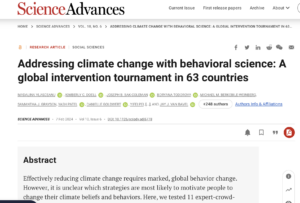https://www.science.org/doi/10.1126/sciadv.adj5778
SCIENCE ADVANCES
7 Feb 2024
Vol 10, Issue 6
Abstract
Effectively reducing climate change requires marked, global behavior change. However, it is unclear which strategies are most likely to motivate people to change their climate beliefs and behaviors. Here, we tested 11 expert-crowdsourced interventions on four climate mitigation outcomes: beliefs, policy support, information sharing intention, and an effortful tree-planting behavioral task. Across 59,440 participants from 63 countries, the interventions’ effectiveness was small, largely limited to nonclimate skeptics, and differed across outcomes: Beliefs were strengthened mostly by decreasing psychological distance (by 2.3%), policy support by writing a letter to a future-generation member (2.6%), information sharing by negative emotion induction (12.1%), and no intervention increased the more effortful behavior—several interventions even reduced tree planting. Last, the effects of each intervention differed depending on people’s initial climate beliefs. These findings suggest that the impact of behavioral climate interventions varies across audiences and target behaviors.
INTRODUCTION
The climate crisis is one of humanity’s most consequential and challenging problems (1). Successfully rising to the challenge depends on both “top-down” structural changes (e.g., regulation and investment) and “bottom-up” changes (e.g., individuals’ and collectives’ beliefs and behaviors). These bottom-up processes require widespread belief in climate change, support for climate change policy, and willingness to engage in climate action (2–4). The behavioral sciences have been seen as a crucial component in promoting bottom-up change, through the development of large-scale interventions that can shift public opinion and enable and support top-down governmental climate policies (5–7). However, it is unclear which strategies are most likely to motivate people to change their climate change beliefs and climate mitigation behaviors. Here, we assess the effectiveness of expert-crowdsourced, theoretically derived interventions at promoting a range of climate change mitigation behaviors in a large and diverse global sample.
A growing body of research across the behavioral sciences has been investigating intervention strategies aimed at boosting sustainable intentions and behaviors such as recycling, public transportation use, and household energy saving (3, 8, 9). For instance, communications aimed at reducing the psychological distance of climate change, by making it feel more geographically, socially, and temporally close, were effective at increasing climate concern and amplifying self-reported intentions to engage in mitigating behaviors, such as reducing energy consumption (10). Similarly, normative appeals that include an invitation to work together and “join in” were found effective at influencing behaviors such as charitable giving (11). These are only two examples in a growing list of behavioral interventions designed to mitigate climate change. Hence, there are numerous competing theories in the behavioral sciences about how to stimulate climate change beliefs and proenvironmental behaviors.
#
Full study here: https://www.science.org/doi/10.1126/sciadv.adj5778
Watch: Morano on @tntradiolive talks about the Climate PSYOP –
Climate PSYOP is now in full swing. A Peer-reviewed study in the journal Science Advances talks about the need to 'address climate change with behavioral science, effectively reducing climate change… pic.twitter.com/Fee4c937yy
— Marc Morano (@ClimateDepot) February 10, 2024
Addressing climate change with behavioral science: A global intervention tournament in 63 countries
SCIENCE ADVANCES – 7 Feb 2024 – Vol 10, Issue 6 –DOI: 10.1126/sciadv.adj5778
“Effectively reducing climate change requires marked, global behavior change…A growing body of research across the behavioral sciences has been investigating intervention strategies aimed at boosting sustainable intentions and behaviors such as recycling, public transportation use, and household energy saving (3, 8, 9). For instance, communications aimed at reducing the psychological distance of climate change, by making it feel more geographically, socially, and temporally close, were effective at increasing climate concern and amplifying self-reported intentions to engage in mitigating behaviors, such as reducing energy consumption.”



